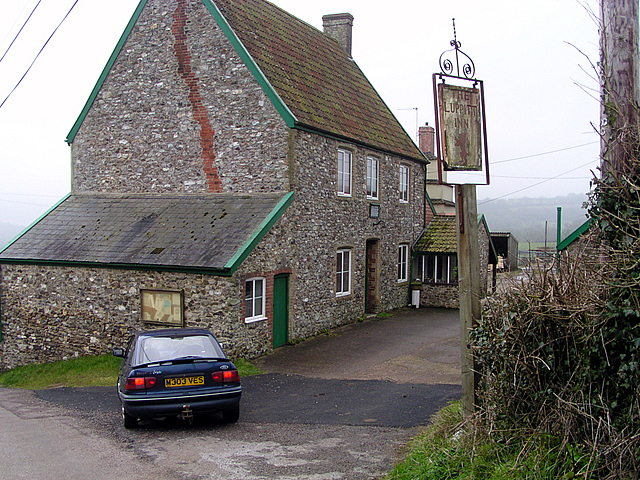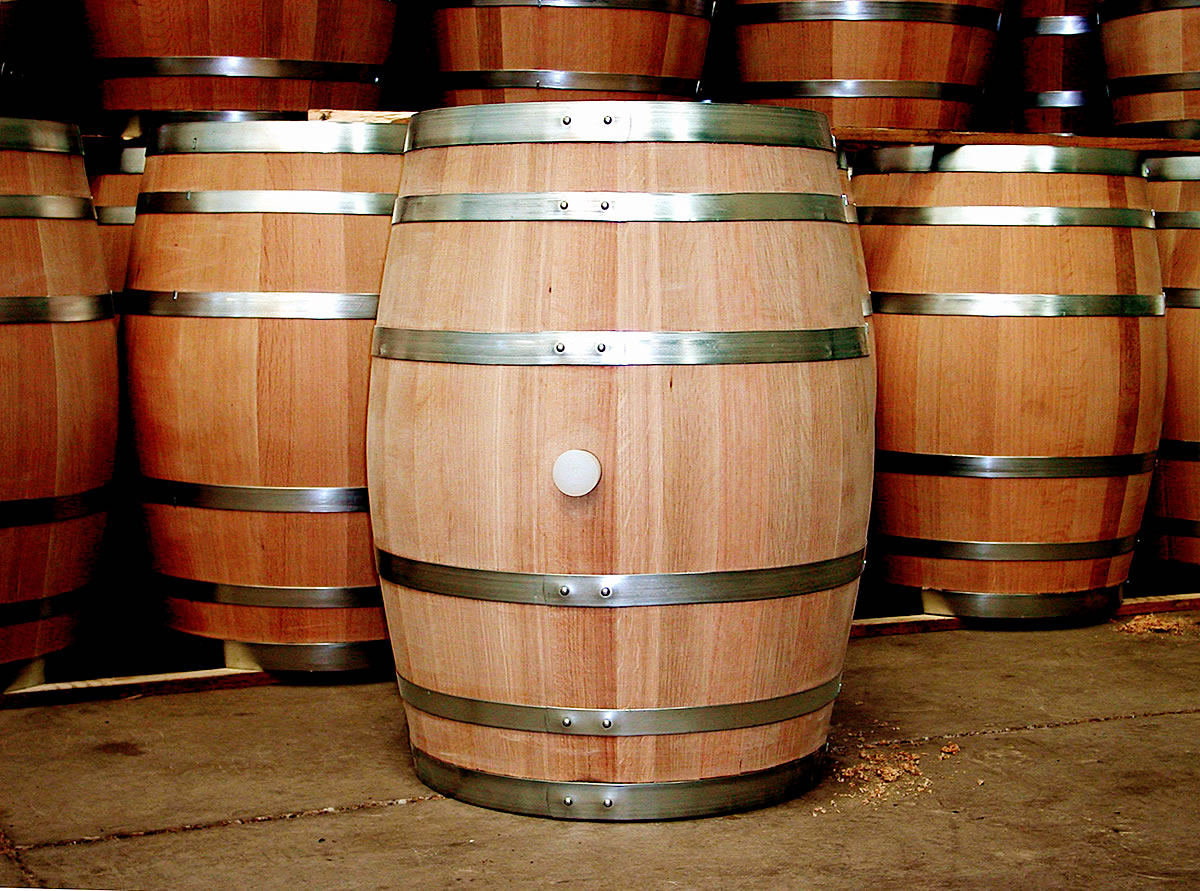|
Luppitt Inn
The Luppitt Inn is the only public house at Luppitt, Devon. Located in the front rooms of a farmhouse, the building is constructed from stone, rendered on one side and includes a tiled roof. The main house, still part of a working farm, was built in the early 19th century. The pub entrance is on the north side of the house, leading to a two-roomed pub. The serving room includes a simple counter made of matchboard, and some simple shelves, as well as a few seats, whilst the second room includes a brick fireplace. The toilets are outside, across the yard. The only table in the pub is covered in puzzles. The unique layout has meant that the pub is on the Campaign for Real Ale's National Inventory of Historic Pub Interiors. Previously known as the Red Lion Inn, Luppitt, it is a farmhouse pub which would have been common around England in the 19th century. One of the last small, informal alehouses in Britain, it does have the licence to sell alcohol. However, it sells only one beer, bre ... [...More Info...] [...Related Items...] OR: [Wikipedia] [Google] [Baidu] |
Luppitt
Luppitt is a village and civil parish in East Devon situated about due north of Honiton. The historian William Harris was preacher at the village's Presbyterian chapel from 1741 to 1770. Towards the end of his life, the painter Robert Polhill Bevan (1865-1925) had a cottage called Marlpits on Luppitt Common, in which he painted a number of views of the neighbourhood. The Luppitt Inn is a public house on the Campaign for Real Ale's National Inventory of Historic Pub Interiors. Historic estates * Mohuns Ottery, a seat of the Carew family, Barons Carew.Pevsner, Nikolaus Sir Nikolaus Bernhard Leon Pevsner (30 January 1902 – 18 August 1983) was a German-British art historian and architectural historian best known for his monumental 46-volume series of county-by-county guides, ''The Buildings of England'' (19 ... & Cherry, Bridget, The Buildings of England: Devon, London, 2004, p.543 See: William Henry Hamilton Rogers (1823-1913), ''Memorials of the West, Historical ... [...More Info...] [...Related Items...] OR: [Wikipedia] [Google] [Baidu] |
Public House
A pub (short for public house) is a kind of drinking establishment which is licensed to serve alcoholic drinks for consumption on the premises. The term ''public house'' first appeared in the United Kingdom in late 17th century, and was used to differentiate private houses from those which were, quite literally, open to the public as "alehouses", " taverns" and " inns". By Georgian times, the term had become common parlance, although taverns, as a distinct establishment, had largely ceased to exist by the beginning of the 19th century. Today, there is no strict definition, but CAMRA states a pub has four characteristics:GLA Economics, Closing time: London's public houses, 2017 # is open to the public without membership or residency # serves draught beer or cider without requiring food be consumed # has at least one indoor area not laid out for meals # allows drinks to be bought at a bar (i.e., not only table service) The history of pubs can be traced to Roman taverns ... [...More Info...] [...Related Items...] OR: [Wikipedia] [Google] [Baidu] |
Campaign For Real Ale
The Campaign for Real Ale (CAMRA) is an independent voluntary consumer organisation headquartered in St Albans, England, which promotes real ale, cider and perry and traditional British pubs and clubs. With just under 155,000 members, it is the largest single-issue consumer group in the UK, and is a founding member of the European Beer Consumers Union (EBCU). History The organisation was founded on 16 March 1971 in Kruger's Bar, Dunquin, Kerry, Ireland, by Michael Hardman, Graham Lees, Jim Makin, and Bill Mellor, who were opposed to the growing mass production of beer and the homogenisation of the British brewing industry. The original name was the Campaign for the Revitalisation of Ale. Following the formation of the Campaign, the first annual general meeting took place in 1972, at the Rose Inn in Coton Road, Nuneaton. Early membership consisted of the four founders and their friends. Interest in CAMRA and its objectives spread rapidly, with 5,000 members signed up by ... [...More Info...] [...Related Items...] OR: [Wikipedia] [Google] [Baidu] |
National Inventory Of Historic Pub Interiors
The National Inventory of Historic Pub Interiors is a register of public houses in the United Kingdom with interiors which have been noted as being of significant historic interest, having remained largely unchanged for at least 30 years, but usually since at least World War II. The National Inventory was begun by (and is maintained by) the Campaign for Real Ale as part of that organisation's mission to protect Britain's pub heritage as well as good beer. CAMRA is an independent, voluntary, consumer organisation based in St Albans, England, whose main aims are promoting real ale and the traditional British pub. It is now the largest single-issue consumer group in the UK. Within CAMRA, the "Pub Heritage Group" is established to identify, record and help protect public house interiors of historic and/or architectural importance, and seeks to get them listed, if they are not already. The group maintains two inventories of "Heritage pubs", the National Inventory (NI) and the Regio ... [...More Info...] [...Related Items...] OR: [Wikipedia] [Google] [Baidu] |
Otter Brewery
Otter Brewery is a brewery in Luppitt, near Honiton, Devon, and named after the nearby River Otter. The brewery was founded in 1990 by David and Mary Ann McCaig and is still run by the family, who also run a pub owned by the company, the Holt in Honiton. The company invests heavily in sustainability, with such innovations as a cellar built mostly underground to save the needs for refrigeration and the use of reed beds to recycle waste water. Awards Otter Brewery has won a number of awards, including The Good Pub Guide "Brewery of the Year" in 2013 as well as being named "Most Sustainable Brewery" at the 2011 Society of Independent Brewers The Society of Independent Brewers (formerly the Small Independent Brewers Association, or SIBA) is an organization representing the interests of independent breweries in the UK. Founded in 1980, it was intended to fight the pub-tie system, u ... awards. Products Otter produce five regular beers and two lagers, as well as speciality and ... [...More Info...] [...Related Items...] OR: [Wikipedia] [Google] [Baidu] |
Cask
A barrel or cask is a hollow cylindrical container with a bulging center, longer than it is wide. They are traditionally made of wooden staves and bound by wooden or metal hoops. The word vat is often used for large containers for liquids, usually alcoholic beverages; a small barrel or cask is known as a keg. Modern wooden barrels for wine-making are made of French common oak ('' Quercus robur''), white oak ('' Quercus petraea''), American white oak (''Quercus alba''), more exotic is Mizunara Oak all typically have standard sizes: Recently Oregon Oak ( Quercus Garryana) has been used. *"Bordeaux type" , *"Burgundy type" and *"Cognac type" . Modern barrels and casks can also be made of aluminum, stainless steel, and different types of plastic, such as HDPE. Someone who makes barrels is called a "barrel maker" or cooper (coopers also make buckets, vats, tubs, butter churns, hogsheads, firkins, kegs, kilderkins, tierces, rundlets, puncheons, pipes, tuns, butts, ... [...More Info...] [...Related Items...] OR: [Wikipedia] [Google] [Baidu] |
National Inventory Pubs
The National Inventory of Historic Pub Interiors is a register of public houses in the United Kingdom with interiors which have been noted as being of significant historic interest, having remained largely unchanged for at least 30 years, but usually since at least World War II. The National Inventory was begun by (and is maintained by) the Campaign for Real Ale as part of that organisation's mission to protect Britain's pub heritage as well as good beer. CAMRA is an independent, voluntary, consumer organisation based in St Albans, England, whose main aims are promoting real ale and the traditional British pub. It is now the largest single-issue consumer group in the UK. Within CAMRA, the "Pub Heritage Group" is established to identify, record and help protect public house interiors of historic and/or architectural importance, and seeks to get them listed, if they are not already. The group maintains two inventories of "Heritage pubs", the National Inventory (NI) and the Regiona ... [...More Info...] [...Related Items...] OR: [Wikipedia] [Google] [Baidu] |
Pubs In Devon
A pub (short for public house) is a kind of drinking establishment which is licensed to serve alcoholic drinks for consumption on the premises. The term ''public house'' first appeared in the United Kingdom in late 17th century, and was used to differentiate private houses from those which were, quite literally, open to the public as "alehouses", "taverns" and "inns". By Georgian times, the term had become common parlance, although taverns, as a distinct establishment, had largely ceased to exist by the beginning of the 19th century. Today, there is no strict definition, but CAMRA states a pub has four characteristics:GLA Economics, Closing time: London's public houses, 2017 # is open to the public without membership or residency # serves draught beer or cider without requiring food be consumed # has at least one indoor area not laid out for meals # allows drinks to be bought at a bar (i.e., not only table service) The history of pubs can be traced to Roman taverns in B ... [...More Info...] [...Related Items...] OR: [Wikipedia] [Google] [Baidu] |


.jpg)

